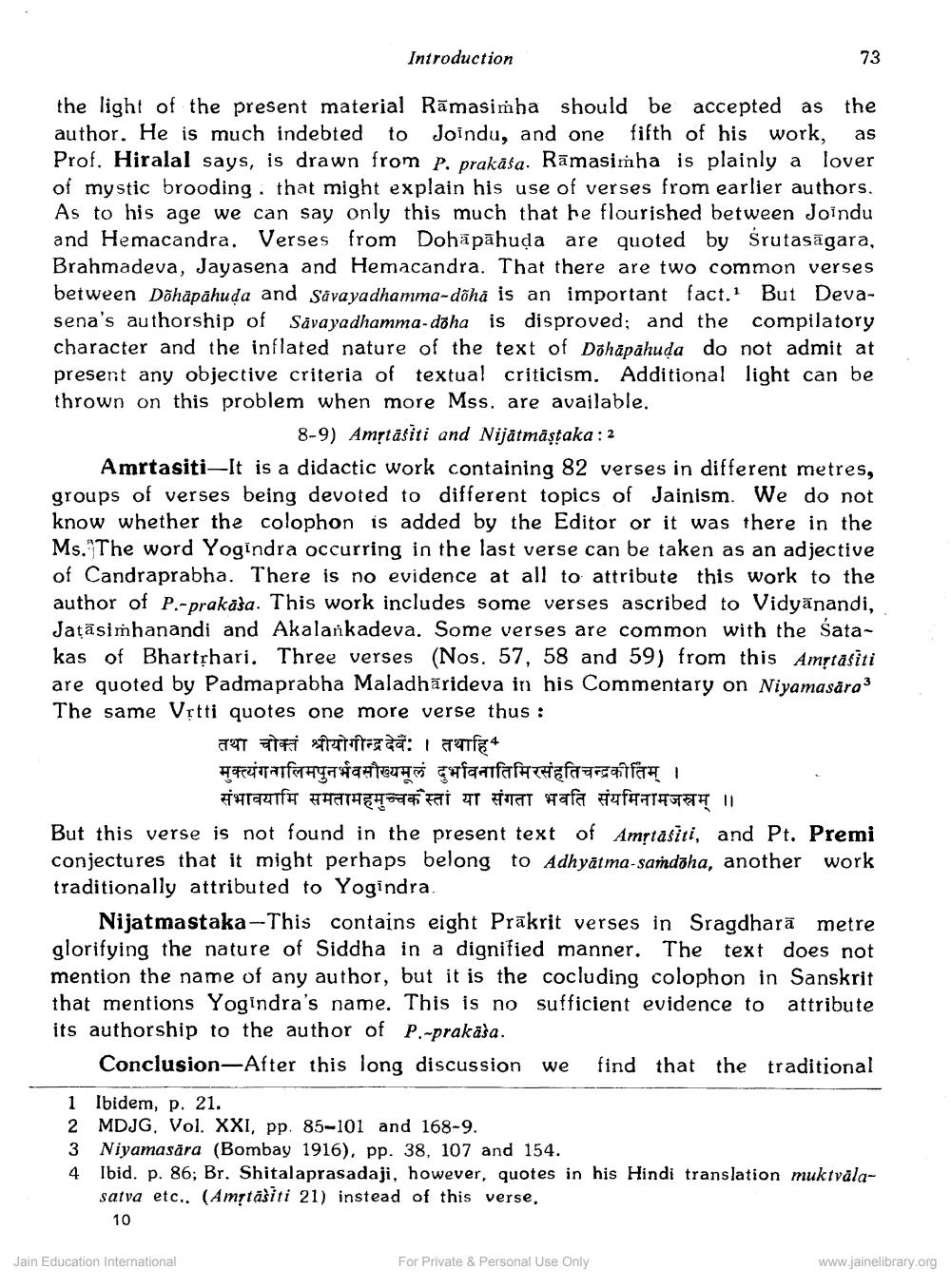________________
Introduction
the light of the present material Rāmasimha should be accepted as the author. He is much indebted to Joindu, and one fifth of his work, as Prof. Hiralal says, is drawn from P. prakāša. Rāmasimha is plainly a lover of mystic brooding that might explain his use of verses from earlier authors. As to his age we can say only this much that he flourished between Joindu and Hemacandra. Verses from Dohāpāhuda are quoted by Srutasāgara, Brahmadeva, Jayasena and Hemacandra. That there are two common verses between Dõhāpāhuda and Savayadhamma-dõha is an important fact. But Devasena's authorship of Savayadhamma-dõha is disproved; and the compilatory character and the inflated nature of the text of Dohāpāhuda do not admit at present any objective criteria of textual criticism. Additional light can be thrown on this problem when more Mss. are available.
8-9) Amstafiti and Nijātmāştaka : 2 Amrtasiti-It is a didactic work containing 82 verses in different metres, groups of verses being devoted to different topics of Jainism. We do not know whether the colophon is added by the Editor or it was there in the Ms. The word Yogindra occurring in the last verse can be taken as an adjective of Candraprabha. There is no evidence at all to attribute this work to the author of P.-prakasa. This work includes some verses ascribed to Vidyānandi, Jațāsimhanandi and Akalankadeva. Some verses are common with the satakas of Bharthari. Three verses (Nos, 57, 58 and 59) from this Amrtašiti are quoted by Padmaprabha Maladhārideva in his Commentary on Niyamasära3 The same Vștti quotes one more verse thus :
तथा चोक्तं श्रीयोगीन्द्र देवैः । तथाहि+ मुक्त्यंगनालिमपुनर्भवसौख्यमूलं दुर्भावनातिमिरसंहतिचन्द्रकीर्तिम् ।
संभावयामि समतामहमुच्चकै स्तां या संगता भवति संयमिनामजस्रम् ।। But this verse is not found in the present text of Amrtasiti, and Pt. Premi conjectures that it might perhaps belong to Adhyātma-samdoha, another work traditionally attributed to Yogindra.
Nijatmastaka-This contains eight Prākrit verses in Sragdharā metre glorifying the nature of Siddha in a dignified manner. The text does not mention the name of any author, but it is the cocluding colophon in Sanskrit that mentions Yogindra's name. This is no sufficient evidence to attribute its authorship to the author of P.-prakāša.
Conclusion-After this long discussion we find that the traditional
1 Ibidem, p. 21. 2 MDJG, Vol. XXI, pp. 85-101 and 168-9. 3 Niyamasāra (Bombay 1916), pp. 38, 107 and 154. 4 Ibid. p. 86; Br. Shitalaprasadaji, however, quotes in his Hindi translation muktvala
satva etc.. (Amstäšiti 21) instead of this verse,
10
Jain Education International
For Private & Personal Use Only
www.jainelibrary.org




